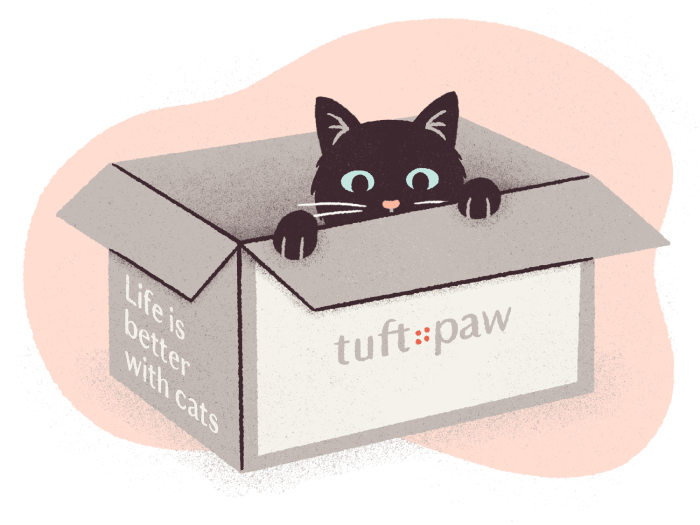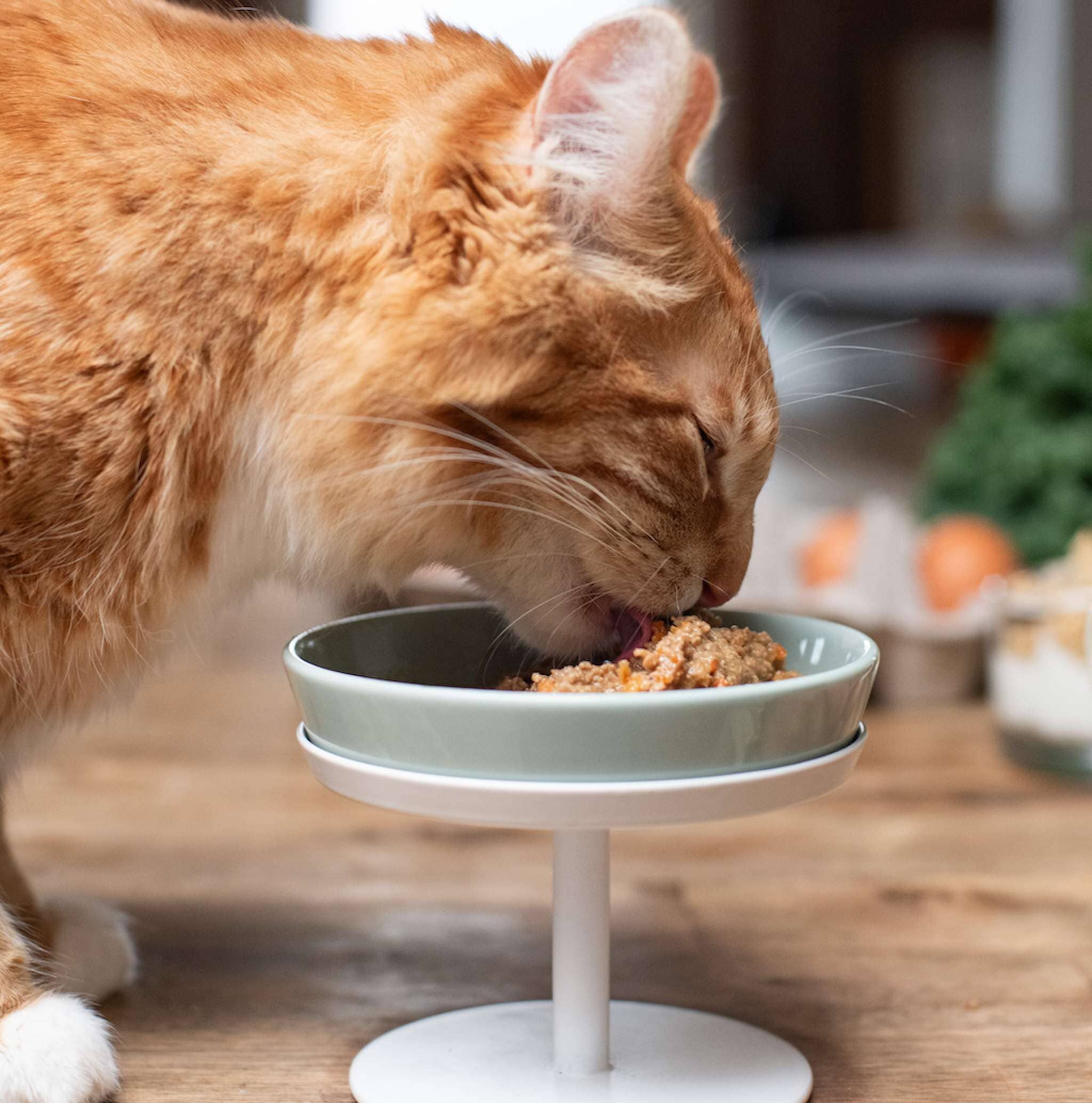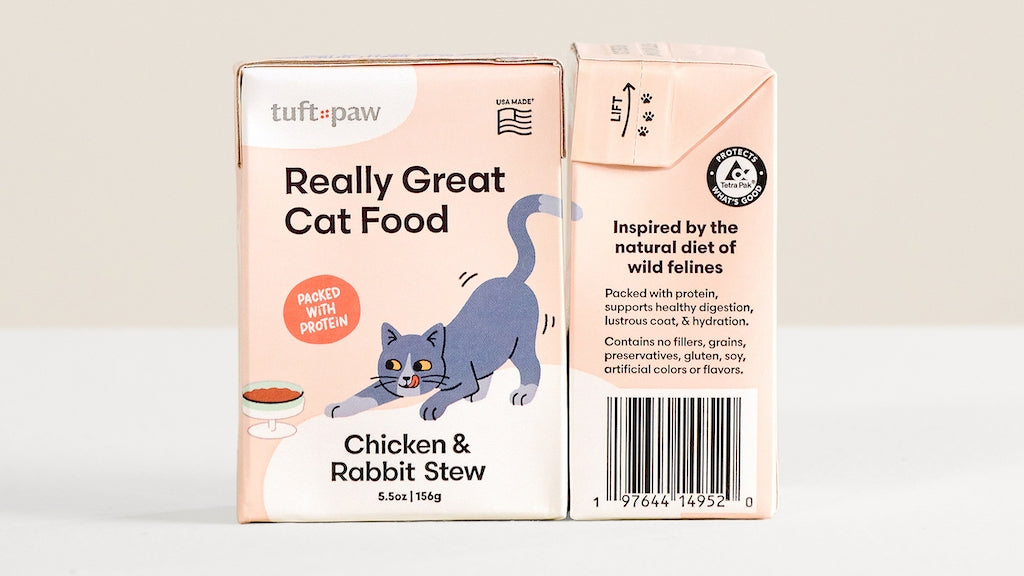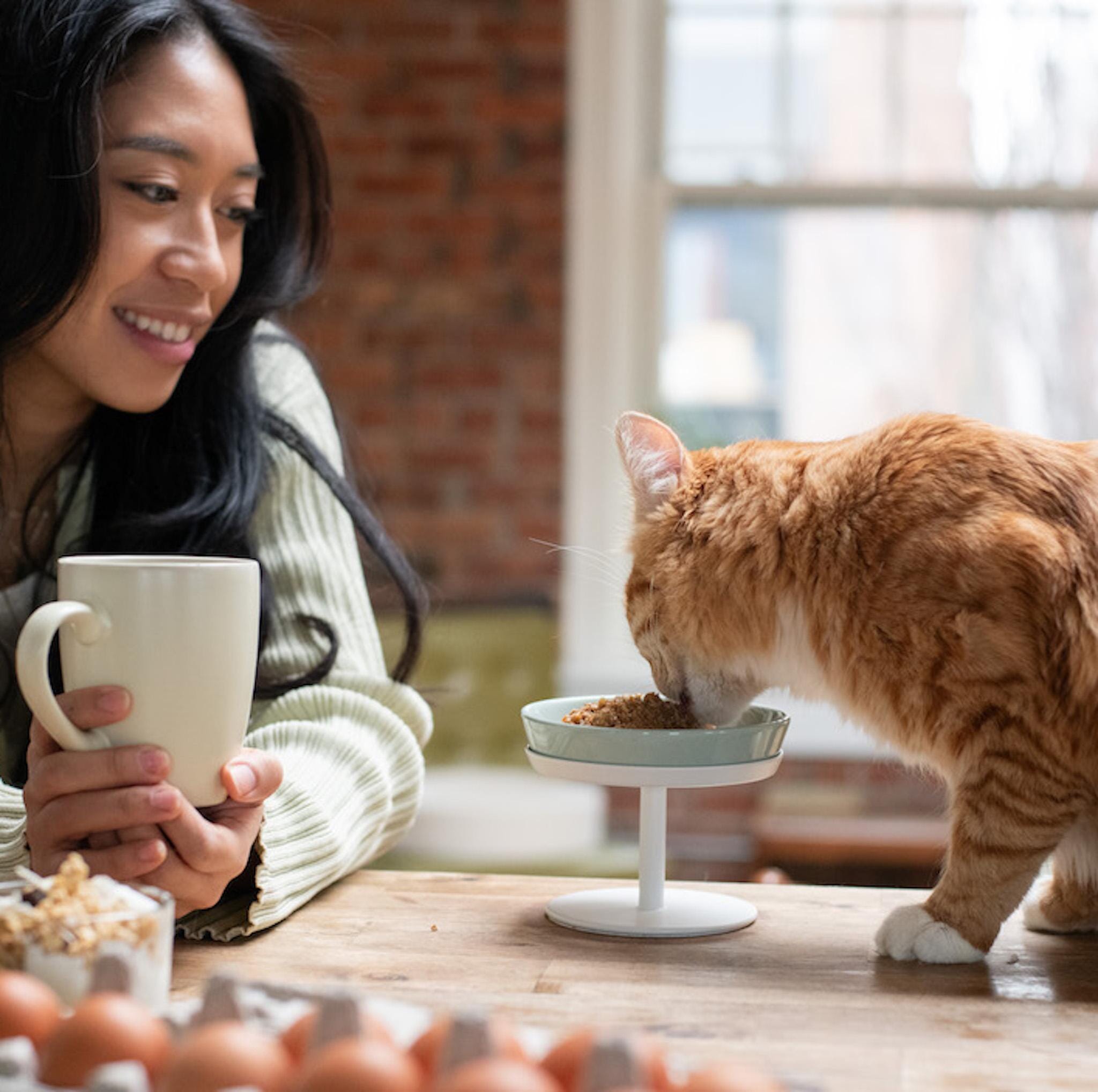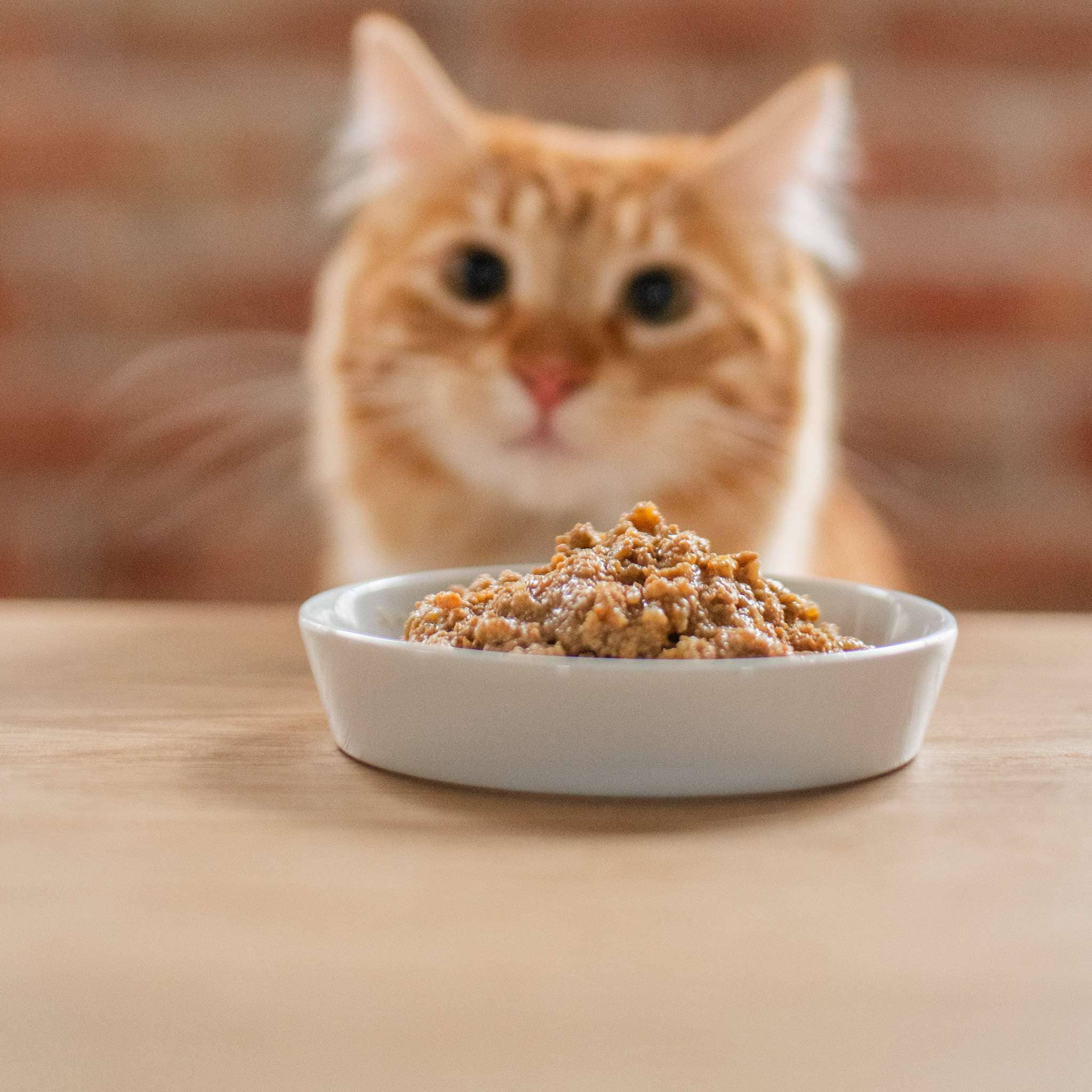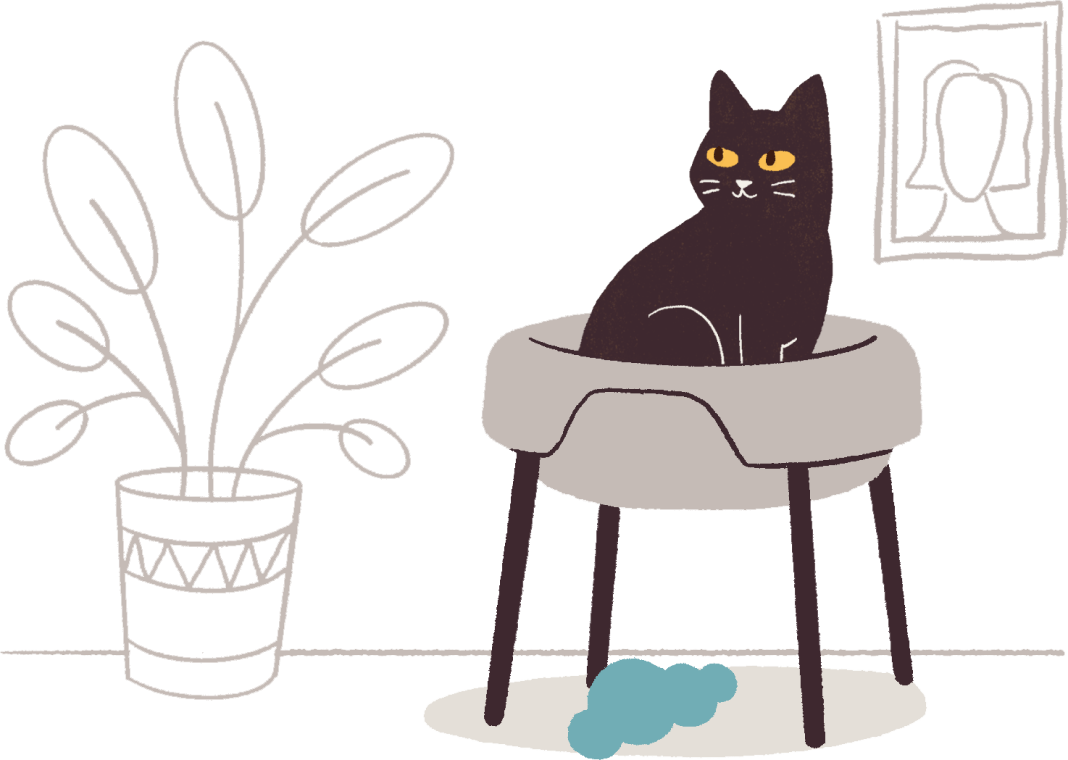Cats can have sensitive stomachs just like humans, which can impact their quality of life and cause all sorts of problems in your home. Finding the right food for a cat with a sensitive stomach is a crucial part of treating their digestive issues and improving their well-being. In this comprehensive guide, we'll go over what makes a given cat food appropriate for sensitive stomachs, provide practical tips for helping your cat, and give you our picks for the best cat foods for sensitive stomachs on the market today.
Here at tuft + paw, we are cat experts. We're intimately familiar with the cat food features that are most important to cats and cat parents alike. This list is based on consultation with a feline nutritionist, veterinarian, hundreds of online reviews, and our own experience as cat parents.
Cheat Sheet: The Best Foods for Cats With Sensitive Stomachs
1) tuft + paw Really Great Cat Food
| Pros | high quality animal protein, first 2 ingredients are chicken-based, low carbohydrates, no fillers, dietary fiber to aid digestion, salmon oil for omega-3s, affordable price point, high moisture content, human-grade ingredients |
| Cons | not available in pet stores |
| Calories | 138 cal/5.5 oz box = 25 cal/oz |
| Price | $69 for 24 x 5.5 oz box = $0.52/oz |
2) Koha Limited Ingredient Diet Rabbit Au Jus for Cats
| Pros | high quality animal protein, 96% rabbit dry matter, novel protein for cats with food allergies, low carbohydrates, very high moisture content, green mussel for omega-3s |
| Cons | pricey, unsuitable for kittens |
| Calories | 139 cal/5.5 oz = 25 cal/oz |
| Price | $96.76 for 24 x 5.5-oz cans = $0.73/oz |
3) Honest Kitchen Grain-Free Chicken Pate Wet Cat Food
| Pros | high quality animal protein, first 3 ingredients are chicken-based, no fillers, high moisture content, human-grade ingredients, many other formula options |
| Cons | mediocre omega-3 supplement |
| Calories | 171 cal/5.5 oz box = 31 cal/oz |
| Price | $77.72 for 24 x 5.5 oz box = $0.59/oz |
4) Smalls Ground Other Bird Cat Food
| Pros | high quality animal protein, first 2 ingredients are turkey-based, low carbohydrates, human-grade ingredients, cod liver oil for omega-3s, convenient subscription service |
| Cons | pricey, may need to add water when serving, not available in pet stores, food ships frozen |
| Calories | 200 cal/5 oz pack = 40 cal/oz |
| Price | $4.00 per 5 oz pack = $0.80/oz |
5) Merrick Limited Ingredient Diet Chicken Recipe
| Pros | high quality animal protein, single protein source, low carbohydrates, good moisture content, affordable price point |
| Cons | contains guar gum, unsuitable for kittens, no animal omega-3 supplement |
| Calories | 183 cal/5-oz can = 37 cal/oz |
| Price | $62.16 for 24 x 5-oz cans = $0.52/oz |
6) Hill's Prescription Diet z/d Food Sensitivities Wet Food
| Pros | hydrolyzed animal protein to minimize sensitivities, single protein source, good moisture content |
| Cons | pricey, high carb content, some cats don’t like it, recent poor reviews, contains soybean oil and corn starch |
| Calories | 173 cal/5.5-oz can = 31 cal/oz |
| Price | $91.99 for 24 x 5.5-oz cans = $0.70/oz |
What Is Cat Food for Sensitive Stomachs?
Cat food designed for sensitive stomachs is formulated to provide optimal nutrition while being gentle on your cat’s digestive system. These formulas typically feature high-quality ingredients that are easy to digest (e.g. chicken liver) and exclude ingredients that could be problematic. This could take the form of limited ingredient formulas, hydrolyzed proteins, or an absence of fillers and gums. Ultimately, the goal is to provide a balanced and nutritious diet that will minimize any digestive irritation that causes symptoms like frequent vomiting or diarrhea.
Unfortunately, there is no silver bullet for treating a cat’s sensitive stomach. Digestive issues can be caused by a wide variety of factors, so only by diagnosing the problem can you confidently pick the right food to treat it. We always recommend seeing the vet if your cat experiences regular digestive issues.
Common Signs of Stomach Sensitivity in Cats
Signs of a sensitive stomach in cats include vomiting, diarrhea, constipation, flatulence, and frequent hairballs. If you observe these symptoms, it's recommended to consult your veterinarian for a proper diagnosis.
 Really Great Cat Food & Dock Bowl and Stand by tuft + paw
Really Great Cat Food & Dock Bowl and Stand by tuft + paw
Possible Causes of Stomach Sensitivity
Understanding the potential causes of stomach sensitivity in cats is the first step toward finding the most suitable dietary solution. Cats may develop sensitive stomachs due to various reasons, including:
Food Allergies or Sensitivities
Like humans, cats can develop allergies or sensitivities to certain ingredients in their food. Some typical allergens are animal ingredients like beef, dairy, and fish. Less common are allergies to grains like wheat and corn. If your cat does have a food allergy, identifying and eliminating the trigger can significantly improve your cat’s health.
Abrupt Diet Changes
Cats are creatures of habit, and sudden changes to their diet can lead to upset tummies. A gradual transition between different foods is essential to allow their digestive system and gut microbiome to adapt to the new food. This approach is recommended for any food transition, such as when switching from kitten to cat food.
Low-Quality Ingredients
Some commercial cat foods may contain ingredients like carrageenan, gums, and filler carbs. Cats are able to digest carbohydrates, but as obligate carnivores their digestive tract is optimized for a diet high in animal proteins and low in fiber. There is little conclusive research available on the precise effects of these ingredients in their diet, but in general it’s a good idea to feed them a diet that primarily consists of easily digestible animal protein. This can help avoid potential dietary complications and improve their overall health.
 Really Great Cat Food & Dock Bowl and Stand by tuft + paw
Really Great Cat Food & Dock Bowl and Stand by tuft + paw
Tips for Helping a Cat With a Sensitive Stomach
If you suspect your cat has a sensitive stomach, there are several practical steps you can take to promote digestive comfort and well-being:
Stick With One Cat Food
Transitioning between different cat foods frequently can disrupt your cat's digestive system. Choose a high-quality cat food that meets their nutritional needs and stick with it to provide consistency for their stomach and gut microbiome.
Prioritize Wet Cat Food
Wet cat food has higher moisture content than dry kibble, which can be beneficial for cats with sensitive stomachs. The increased hydration supports digestion and keeps things moving along smoothly. Wet food is also typically higher in protein and lower in carbs than dry kibble, which makes it easier to digest for cats with delicate tummies.
Tip: Wet food is the best food for indoor cats due to the lower caloric density compared to dry kibble, which prevents excess weight gain.
Consult Your Vet
If you notice persistent digestive issues, consulting your veterinarian is essential. They can help identify the root cause of the sensitivity and recommend a suitable dietary plan. Professional guidance ensures you're addressing your cat's specific needs and not accidentally worsening the problem by feeding them the wrong food.
 Really Great Cat Food & Dock Bowl by tuft + paw
Really Great Cat Food & Dock Bowl by tuft + paw
What to Look For in Cat Food for Sensitive Stomachs
Easily Digestible Animal Protein
Cats are obligate carnivores, so their digestive systems have evolved to break down and absorb nutrients from animal proteins. Stick to this natural requirement by providing food with high-quality, easily digestible animal proteins such as chicken or rabbit. These proteins provide essential amino acids, fats, vitamins, and minerals without putting unnecessary strain on the digestive system, which is why we always recommend high protein cat foods.
For cats with protein allergies, the vet may prescribe them a hydrolyzed protein cat food. Hydrolyzed protein has been broken down into extremely small component molecules which avoid triggering the immune system’s allergic response.
Novel Proteins
Cats typically develop allergies to proteins they have consumed before, so feeding them a protein they’ve never had before (i.e. a “novel protein”) can help soothe their digestive issues. For example, if your cat has always eaten foods with beef or chicken, you could try a salmon-based cat food.
Limited Ingredients
Simple, limited ingredient formulas can be helpful for cats with sensitivities—think of it like an elimination diet for cats. Avoiding unnecessary additives and potential allergens reduces the likelihood of stomach upset. Look for foods with a single protein source, minimal additives, and a relatively short ingredients list.
Minimal Carbs
All cat foods should prioritize protein and fats over carbohydrates. Cats in the wild eat minimal carbs (i.e. just what’s in their prey’s stomach), and replicating this at home supports their nutritional needs. As mentioned above, cats’ digestive systems are far better adapted to digesting and absorbing nutrients from protein sources than carbs, which is why a great low carb cat food can be very beneficial for your cat's health.
Tip: If your cat has a grain sensitivity, see our list of the best grain-free cat foods for product recommendations. For more
High Moisture Content
Adequate hydration is absolutely crucial for cats with digestive issues. Wet cat food with high moisture content not only facilitates digestion but may also help prevent issues like constipation and urinary tract problems. Furthermore, frequent vomiting or diarrhea removes water from the digestive system, so replenishing that lost moisture is essential.
Dietary Fiber
Some cat food formulas add sources of soluble and insoluble fiber, both of which aid a cat's digestion.
Soluble fiber can be dissolved in water and is prebiotic, meaning it nourishes the good bacteria in the gut. It can also help regulate the time food takes to move through the digestive tract. Prebiotics can be really helpful in preventing and/or managing diarrhea for cats with digestive sensitivities. Examples of good sources of prebiotic fiber are pumpkin and chicory root.
Insoluble fiber is solid plant matter which does not dissolve in water. This kind of fiber can support cats experiencing diarrhea by helping bulk up stool and slowing it down as it moves through the GI tract.
Caloric Density
Cats with sensitive stomachs may benefit from smaller meals and a lower digestive workload. By choosing a cat food with a high caloric density, you can be sure your cat is getting the nutrition and energy they need without having to digest large meals.
Omega-3s to Reduce Inflammation
Omega-3 fatty acids possess anti-inflammatory properties. Including these in your cat's diet can help reduce inflammation in the digestive tract. Look for an omega-3 supplement in cat food, such as salmon or any kind of fish oil.
Tip: Omega-3 fatty acids should also be supplemented in the best kitten foods to aid with brain and eye development.
Meets AAFCO Nutritional Standards & Life Stage Requirements
When selecting cat food, always check if it meets the nutritional standards set by the Association of American Feed Control Officials (AAFCO). This ensures that the food is formulated to provide a complete and balanced diet for your cat. AAFCO compliance is a crucial indicator of the food's quality and suitability for your cat's overall health.
Additionally, check the AAFCO statement on the label to ensure it’s appropriate for your cat's specific life stage. A cat’s different life stages have different nutritional requirements. For example, kittens need more calories than adult cats to support their rapid growth, while senior cats benefit from diets that maintain muscle mass.
Here are the key AAFCO terms you’ll see on a label:
- Complete and Balanced – “Complete” means the product contains all the nutrients required. “Balanced” means the nutrients are present in the correct ratios.
- “Growth” life stage – Early life stage when kittens have greater nutritional needs to fuel their growth and development.
- “Maintenance” life stage – Adult cats who are no longer growing only require nutrition for maintenance of a healthy body weight.
- “Gestation/lactation” life stage – Pregnant/mother cats who need to feed their kittens have greater nutritional needs than non-pregnant, non-lactating adult cats.
- All life stages – This means the food is appropriate for both kittens and adult cats, though feeding directions will vary depending on your cat’s life stage. These foods can help take the guesswork out of switching from kitten to adult cat food.
Our Criteria for Choosing the Best Cat Food for Sensitive Stomachs
- Meets AAFCO Standards – All foods on this list are formulated to meet the AAFCO Cat Food Nutrient Profiles for either adult cats, growth and reproduction, or all life stages.
- High quality animal protein – All foods on this list prioritize easily digestible animal proteins as their first ingredients rather than animal byproducts.
- Healthy fats – Quality cat food should contain healthy fats from animal sources, such as meat or fish oil.
- Moisture content – High moisture content in food facilitates digestion and helps cats avoid the health problems associated with dehydration.
- Carbs & plant-based content – Cats are obligate carnivores who should be eating primarily animal protein, so we prefer foods with low carbohydrate content and low plant material content.
- Price
Deep Dive: The Best Foods for Cats With Sensitive Stomachs
1) tuft + paw Really Great Cat Food
Price: $69 for 24 x 5.5 oz box = $0.52/oz
Calories: 138 cal/5.5 oz box = 25 cal/oz
Life Stage: all life stages
Disclaimer: Yes, we included our own cat food here. This is because we truly think it performs excellently compared to other cat foods on the market. We subjected it to the same scrutiny as every other food on this list and asked for honest opinions from experts and cat parents.
Our pick for the best food for cats with sensitive stomachs is tuft + paw’s Really Great Cat Food. A central requirement for cats with sensitive stomachs is that their food is easily digestible, which means it prioritizes high quality animal protein and fats. Really Great Cat Food achieves exactly that. Chicken and rabbit are the primary meat sources, both of which are biologically appropriate for cats and match what they would be eating in the wild: birds and small mammals. . Together these two meat sources provide essential amino acids and fatty acids, particularly taurine and arachidonic acid which are both especially vital to cats. The salmon oil provides a boost of omega-3s to aid immune function, reduce inflammation, and assist in brain and eye health. There are no filler carbs and each plant-based ingredient is there for specific nutritional reasons (e.g. pumpkin puree for dietary fiber to prevent hairballs, moisture, and vitamins A, C, and K). The high moisture content and lack of gums and grains facilitate digestion and keep things running smoothly in the GI tract. Cat parents will also appreciate the convenient subscription service and affordable price tag of $0.52/oz.
|
Ingredients: chicken, chicken broth, pumpkin puree, rabbit, carrots, ground golden flaxseed, natural flavor, tricalcium phosphate, agar-agar, salmon oil, dandelion greens, potassium chloride, vitamins , magnesium amino acid chelate, choline chloride, taurine, minerals , sea salt. |
|
Guaranteed Analysis
|
Dry Matter Analysis
|
| Pros | Cons |
|
|
2) Koha Limited Ingredient Diet Rabbit Au Jus for Cats
 Credit: KOHA Pet
Credit: KOHA Pet
Price: $96.76 for 24 x 5.5-oz cans = $0.73/oz
Calories: 139 cal/5.5 oz = 25 cal/oz
Life Stage: adult maintenance
Our runner-up for the best food for cats with sensitive stomachs is Koha’s Limited Ingredient Diet Rabbit Au Jus wet food. Rabbit is a novel protein for most cats, so it’s a great choice for cats with diagnosed or suspected protein allergies. It’s also a biologically appropriate protein source considering that small mammals are common prey for wild cats. Even for cats without sensitive stomachs, this food checks most of our boxes: high in easily digestible animal protein (96% rabbit excluding water content), very low in carbs, and a high moisture content to help with hydration. It even includes green mussels for a boost of anti-inflammatory omega-3s.
Unsurprisingly, this food is on the pricier side at $0.73 per ounce. It’s also designated for “adult maintenance”, so it would not meet the nutritional needs of growing kittens.
|
Ingredients: Rabbit, Water Sufficient For Processing, Ground Flaxseed, New Zealand Green Mussel, Agar Agar, Pumpkin, Potassium Chloride, Choline Chloride, Salt, Taurine, Dried Kale, Cranberries, Ginger, Turmeric, Iron Proteinate, Zinc Proteinate, Vitamin E Supplement, Thiamine Mononitrate, Copper Proteinate, Manganese Proteinate, Sodium Selenite, Niacin Supplement, D-Calcium Pantothenate, Pyridoxine Hydrochloride, Riboflavin Supplement, Vitamin A Supplement, Biotin, Potassium Iodide, Vitamin D3 Supplement, Vitamin B12 Supplement, Folic Acid. |
|
Guaranteed Analysis
|
Dry Matter Analysis
|
| Pros | Cons |
|
|
3) Honest Kitchen Grain-Free Chicken Pate Wet Cat Food
 Credit: The Honest Kitchen
Credit: The Honest Kitchen
Price: $77.72 for 24 x 5.5 oz box = $0.59/oz
Calories: 171 cal/5.5 oz box = 31 cal/oz
Life Stage: all life stages
Our next choice for the best cat food for sensitive stomachs is The Honest Kitchen’s Grain-Free Chicken Pate Wet Cat Food. The first three ingredients are all chicken-based, making it a rich source of easily digestible animal protein. We appreciate the lack of filler carbs and gums, and that every ingredient is human-grade. Cat parents will also like the reasonable price point and the “all life stages” designation, so you can feed your cat this food from kittenhood to old age.
We have no major issues with this food, however we do wish salmon oil was higher up on the ingredients list as an animal-based omega-3 supplement. On an as-fed basis omega-3s only make up 0.1% of this food, which is a little lacking. Omega-3s help control inflammation, support immune health, and are crucial for brain development in kittens. If feeding this food to a kitten, we’d recommend supplementing their diet with other foods high in omega-3s.
|
Ingredients: Chicken, chicken broth, chicken liver, pumpkin, carrots, blueberries, cranberries, natural chicken flavor, calcium carbonate, agar-agar, dandelion greens, potassium chloride, choline chloride, vitamins , magnesium proteinate, taurine, minerals , kelp, yucca schidigera extract, salmon oil. |
|
Guaranteed Analysis
|
Dry Matter Analysis
|
| Pros | Cons |
|
|
4) Smalls Ground Other Bird Cat Food
 Credit: Smalls
Credit: Smalls
Price: $4.00 per 5 oz pack = $0.80/oz
Calories: 200 cal/5 oz pack = 40 cal/oz
Life Stage: all life stages
Our next cat food pick for sensitive stomachs is Smalls Ground Other Bird. This human-grade recipe uses turkey as its only animal protein, which is widely appealing and can be a good alternative for cats with chicken allergies. It’s high in protein and healthy fats, while still providing a bit of dietary fiber to help with digestion. We like that there are no gums, carrageenan, or filler starches. The inclusion of cod liver oil adds some omega-3 fatty acids, which can help reduce inflammation.
Smalls big weakness is the price: at $0.80/oz, it’s the most expensive food on our list ($0.80/oz). Some cat parents may find it slightly inconvenient that it’s only available on Smalls’ website and ships frozen. All Smalls foods need to be thawed before feeding to your cat. The moisture content is decent but cat parents may want to add water when serving to aid digestion.
|
Ingredients: Turkey, turkey liver, green beans, water sufficient for processing, dried yeast, kale, tricalcium phosphate, choline chloride, salt, magnesium proteinate, dandelion greens, taurine, dried kelp, zinc proteinate, iron proteinate, cod liver oil, niacin supplement, vitamin E supplement, vitamin A supplement, copper proteinate, manganese proteinate, thiamine mononitrate, d-calcium pantothenate, pyridoxine hydrochloride, vitamin D3 supplement, riboflavin, vitamin B12 supplement, folic acid, sodium selenite, biotin. |
|
Guaranteed Analysis
|
Dry Matter Analysis
|
| Pros | Cons |
|
|
5) Merrick Limited Ingredient Diet Chicken Recipe
 Credit: Merrick Pet Care
Credit: Merrick Pet Care
Price: $62.16 for 24 x 5-oz cans = $0.52/oz
Calories: 183 cal/5-oz can = 37 cal/oz
Life Stage: adult maintenance
Merrick offers several limited ingredient recipes for cats with food sensitivities, and this grain-free chicken recipe is a great example. Chicken is the only animal protein, and the first three ingredients are all derived from chicken. Beyond chicken, there are very few other ingredients aside from the usual essential vitamins and minerals. Whole flaxseed serves as a source of dietary fiber and ALA (an omega-3 fatty acid). Cat parents will also love the affordable price tag for a limited ingredient food of this quality.
Unfortunately, there are a few drawbacks to this food. It includes guar gum, a thickener and filler which is not nutritionally necessary for cats. There is also no fish oil or other animal-based omega-3 supplement. Flaxseed provides ALA, but this is converted in the body to other omega-3s which fish oil already has in abundance. Basically, flaxseed is not a very efficient source of omega-3s, and therefore isn’t as effective at reducing inflammation. Finally, this food is designated for “adult maintenance”, so it’s not suitable for growing kittens.
|
Ingredients: Deboned Chicken, Chicken Liver, Chicken Broth, Natural Flavors, Tricalcium Phosphate, Whole Flaxseed, Minerals (Potassium Chloride, Magnesium Proteinate, Zinc Sulfate, Ferrous Sulfate, Manganese Sulfate, Copper Sulfate, Potassium Iodide), Guar Gum, Taurine, Salt, Choline Chloride, Vitamins (Vitamin E Supplement, Thiamine Mononitrate, Niacin, Calcium Pantothenate, Vitamin A Supplement, Menadione Sodium Bisulfite Complex, Pyridoxine Hydrochloride, Riboflavin Supplement, Vitamin B-12 Supplement, Biotin, Folic Acid, Vitamin D-3 Supplement). |
|
Guaranteed Analysis
|
Dry Matter Analysis
|
| Pros | Cons |
|
|
6) Hill's Prescription Diet z/d Food Sensitivities Wet Food
 Credit: Chewy
Credit: Chewy
Price: $91.99 for 24 x 5.5-oz cans = $0.70/oz
Calories: 173 cal/5.5-oz can = 31 cal/oz
Life Stage: adult maintenance
For cats with a diagnosed protein allergy, Hill’s Prescription Diet z/d Wet Cat Food may be a good option. As a prescription food, it needs to be purchased with the consultation of a vet. When cats develop protein allergies, their immune system reacts to recognizable features of the allergen protein. Hydrolyzed protein avoids this problem because it has been broken down into amino acids and tiny peptides which your cat’s immune system doesn’t recognize as an allergen. It flies under the immune system’s radar but still provides the necessary amino acids for survival. This food is made from hydrolyzed chicken liver as its single protein source. It also has a high moisture content to help with smooth digestion and hydration.
However, this food has several notable weaknesses. First of all, it’s relatively expensive at $0.70/oz. It also contains soybean oil and corn starch and has a high carbohydrate content. Recent reviews have mentioned a suspected formula change, with their cats refusing to eat it despite having eaten it in the past.
|
Ingredients: Hydrolyzed Chicken Liver, Water, Corn Starch, Powdered Cellulose, Soybean Oil, Calcium Carbonate, Potassium Chloride, DL-Methionine, Choline Chloride, Dicalcium Phosphate, vitamins (Vitamin E Supplement, Thiamine Mononitrate, L-Ascorbyl-2-Polyphosphate (source of Vitamin C), Niacin Supplement, Pyridoxine Hydrochloride, Calcium Pantothenate, Vitamin B12 Supplement, Riboflavin Supplement, Biotin, Vitamin D3 Supplement, Folic Acid), Iodized Salt, Calcium Sulfate, Cysteine, L-Lysine, Taurine, minerals (Zinc Oxide, Ferrous Sulfate, Manganese Sulfate, Copper Sulfate, Calcium Iodate), Potassium Citrate, Beta-Carotene. |
|
Guaranteed Analysis
|
Dry Matter Analysis
|
| Pros | Cons |
|
|
Cat Food for Sensitive Stomachs FAQs
Can I switch my cat's food to a sensitive stomach formula abruptly?
Abrupt diet changes can contribute to stomach upset. Gradually transition your cat to a new sensitive stomach formula over 7-10 days to allow their digestive system to adjust.
What ingredients should I avoid in cat food for sensitive stomachs?
Common allergens like beef, grains, and artificial additives can trigger stomach sensitivities. Opt for cat foods with easily digestible animal proteins, minimal carbs, and limited ingredients.
How can wet cat food benefit a cat with a sensitive stomach?
Wet cat food has higher moisture content, aiding in hydration and digestion. It's particularly beneficial for cats prone to urinary issues and offers a palatable alternative for picky eaters.
Are there home remedies for managing a cat's sensitive stomach?
While dietary changes can help, consulting your vet is essential for an accurate diagnosis. In addition to specialized food, your vet may recommend probiotics or other supplements to support your cat's digestive health.
Conclusion
We know life can be really challenging when your cat has digestive issues, but with the help of your vet and a few dietary changes, you may be able to treat your poor kitty’s upset tummy. Our favorite foods for cats with sensitive stomachs are tuft + paw’s Really Great Cat Food and Koha Pet’s Limited Ingredient Rabbit Au Jus, with their easily digestible proteins and high quality ingredients. Depending on what your cat likes, other good options could be The Honest Kitchen’s Caté, Smalls Ground Other Bird, and Merrick Limited Ingredient Diet Chicken Recipe. Each of these formulas has a single animal protein and minimal additives. For cats with confirmed protein allergies, you can ask your vet about Hill’s Prescription Diet z/d Food Sensitivities Wet Cat Food, which features hydrolyzed chicken liver to avoid allergic reactions. Remember to transition your cat to their new food slowly and exercise plenty of patience. Good luck!
